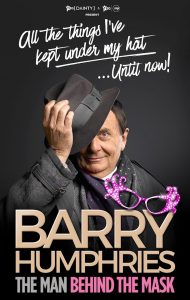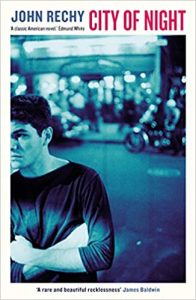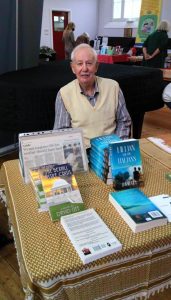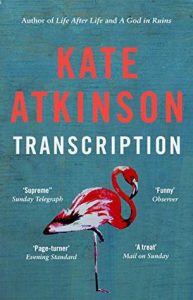What I’m Reading: “Bona to vada your dolly old eke!”
Paul Baker: FABULOSA
Paul Baker’s study of Polari, the “secret gay language”, wears its intensive research lightly, rarely lapsing into tedium and mostly highly entertaining – altogether totally bona, you might say.
“When you learned Polari, you weren’t just learning the words but the attitude that went with them,” Baker tells us. He trawls (no, not ‘trolls’!) through Polari’s rich ancestry dating back to Victorian and Edwardian times, a cocktail of medieval criminal slang, Romany, Latin crossed with Italian, back-slang (‘riah’ = ‘hair’ backwards) and Cockney or ‘Mockney’ used or invented by Merchant Navy gays (‘sea-queens’). The author mentions Crystal Spring – I wonder if that’s the same Crystal whom I trained at a BT Continental call-centre in the 1960s: she had a wondrous command of Polari.
Polari had a heyday in the 1950s when the odd word dropped into a conversation leaked the fact that you were a fellow traveller; drag-queens overused it as a kind of flag-waving. Julian and ‘my friend Sandy’ introduced it to the wider world on BBC Radio in Round the Horne in the late 1960s, but after Decriminalization in 1967 and the growth of Gay Liberation Polari came to be seen as “a toxic relic of a time that everyone wanted to forget.” Even camp was viewed as regressive; John Inman and Quentin Crisp were pilloried for their mincing limp-wristedness. Imported from the US, the ‘clone’ look created a more manly brand imagine for gay men around the world.
Homophobia hasn’t been totally eradicated in the West today, but most us are freely ‘out’ and ‘Proud’. I wonder how gay men and women secretly communicate their identity in ultra-repressive countries like Uganda and Iran. In Iran homosexuals are not hanged, they’re strangled, hauled off the ground by a crane with a rope round their neck. If they have a secret language, let’s keep it secret.
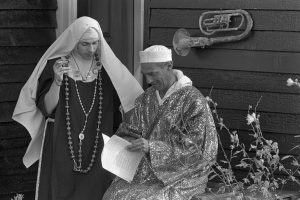
On our cosier shores, camp is still fluttering in the new millennium thanks to RuPaul and his drag-queen cohorts and – God bless ‘em – the Sisters of Perpetual Indulgence whose ‘unholy order’ has outlived some of Rome’s originals! And a few Polari words have entered the general vocabulary: ‘naff’, ‘trade’, ‘butch’. Maybe now, Paul Baker argues, Polari can be recognized as part of the wider History of the Gay Movement, from a time when its use was a kind of defiance. From defiant to dated but not (quite) to defunct.
According to Paul Baker, in the 1960s you could be a ‘chicken’ up to the age of 25, but after that you were old. That was my judgmental mindset in the 1960s, in Earls Court: “Oh God, there’s Grandma” (‘Grandma’ might be in his thirties or forties). No change there today, I’m pretty sure. Sorry, girls!
David at the Movies: A new kind of Adult Movie
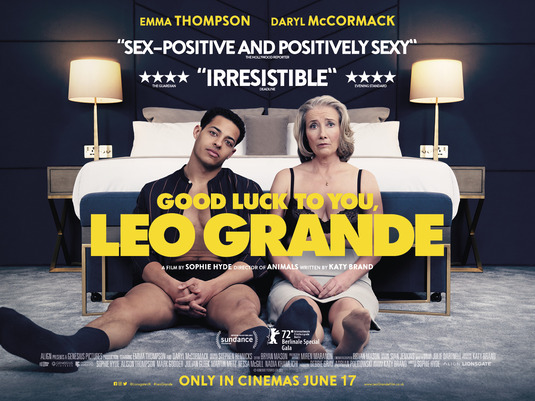
A widow ‘of a certain age’, Nancy (not her real name) books a hotel room and a fit young sex worker, Leo Grande (not his real name). Nancy never had an orgasm during thirty-one years of married life, so she has some catching up to do.
Emma Thompson’s performance and Katy Brand’s crisp script convey very believably the awkwardness and nervousness Nancy feels. Take out the sex and nudity (please don’t!) and this could have been written by Terence Rattigan to be played by Deborah Carr back in the 1950s. There is a degree of theatricality to the film, although Thompson gives her all and courageously bares her all (my mum would say “You could see what she had for breakfast”) in a role that most actresses of her generation would have reluctantly turned down. In 2001 I saw Linda Gray nude, at about the same age as Thompson, in a stage version of The Graduate, and Kathy Bates did a naked hot-tub scene with Jack Nicholson in About Schmidt in 2002 – bravissime these ladies!
Daryl McCormack matches Thompson for both bravura and skill as the young escort who’s not as self-confident as he pretends. More explicit even than Netflix’s Sex Education, this is not a movie for porn perverts, it’s a serious study of desire, disappointment and desperation. Both its stars deserve to pick up awards next winter. And if they make a movie of my novel Lillian and the Italians (please do!), I want Emma Thompson to play Lillian!
What I’m re-reading: Siberian setting for brilliant thriller
Lionel Davidson: KOLYMSKY HEIGHTS
I’ve decided to re-read a few of my favourite books. When I read it in the 1990s I thought that Kolymsky Heights was one of the best adventure thrillers I’d ever read.
A captive scientist in a secret research station deep in Siberia smuggles a message to an Oxford professor he knew earlier in his life. The CIA send Jimmy Porter into the post-Soviet wilderness to infiltrate the station. Porter is a Canadian-Indian (now more wokely called a “native Canadian”), a gifted linguist and survival expert. Getting him into Siberia in the guise of an “indigenous Russian” takes up two thirds of the narrative. What’s going on at the secret establishment has echoes of the X-Files. Getting him out with this world-changing secret is another challenge.
Lionel Davidson vividly recreates the Siberian permafrost and the people who live there (it’s where gold and other minerals are mined in huge quantities). This is a story like no other, bone-chilling in its setting and nerve-shredding in its tension. After twenty-five years I still rate it in my all-time top ten thrillers – maybe in my top five.
David at the theatre: Edna’s comeback – she never went away!

In 2013, on Dame Edna’s “Farewell Tour”, Les Patterson and the lady herself tottered onto the stage of Brighton’s Dome gasping for breath. I half expected to see one of them die on stage, like Sid James or Tommy Cooper. But last night Barry Humphries toddled onto the stage of Eastbourne’s Devonshire Theatre, seemingly sprucer than ever at the age of 88.
This is not (not quite) the Les and Edna show; this is the ‘Making Of’ show, with Humphries talking about his early life in Melbourne and the ‘conceptions’ of Dame Edna as a send-up Australian housewife and Sir Les as a drunken Events Director who got promoted to Cultural Attaché. These two long ago took on lives of their own and are now much-loved figures on the global celebrity circuit.
Humphries talks candidly about his boyhood and his near-fatal struggle with alcoholism. If there was one jarring note last night, it was his quizzing members of the audience about their bathroom decor: cringe-making when Edna does it, this doesn’t work when performed out of Edna costume. Throwing ‘gladdies’ was probably another misjudgment, especially without inviting the lucky recipients to wave them during the closing song.
Overall, the evening was a joyous reunion with Edna and Les – in hilarious video clips, including Edna’s naughty invasion of Charles and Camilla’s box at the the Royal Variety Show in 2013 (www.youtube.com/watch?v=1r3S5UKP7ME).
The Barry Humphries show is touring. Don’t miss it if it’s anywhere near you. Newsflash: we are promised another ‘Farewell Tour’ next year. Edna may take as long to leave the stage as that earlier Australian diva, Dame Joan Sutherland!
What I’m reading: Gay icons resurrected

Peter Scott-Presland: A GAY CENTURY
This is a collection of ten short plays, designed to be performed as mini-operas. I watched several of them, played but not sung, on Zoom last year. They each encapsulate a chapter of gay history, revisited or re-imagined. All of them are clever and interesting. They are all good. A few of them are outstanding. My absolute favourite is the first one, Two Queens, set in 1900, in which Queen Victoria visits Oscar Wilde on his deathbed in Paris. Her Majesty is given liberty to borrow some of Oscar’s most famous lines!
Wilde (or his ghost) pops up in some of the later dramas, affirming his role as the “patron saint” of gay liberation. EM Forster, Siegfried Sassoon. Noel Coward – many iconic gay figures of the century are here, revisited or re-imagined. Radclyffe Hall supplies, rather earnestly, the L in LGBT. Ivor Novello, sentenced to prison for fiddling petrol coupons during WW2, shares a cell with a psychotic gangster. The Jeremy Thorpe scandal is re-interpreted with Norman Scott’s dogs given voices and a key role! There’s an episode in Weimar Berlin that features Gerald Hamilton, said to be the inspiration for Christopher Isherwood’s Mr Norris; the play is a splendid ‘companion piece’ to Cabaret; I’d love to hear it sung.
Peter Scott-Presland has risen splendidly to the challenge of giving historical characters an ironic and incisive new script (to sing!). A Gay Century is a towering achievement. And Volume Two is due out soon.
What I’m reading: A hustler’s odyssey in pre-Aids America

John Rechy:
CITY OF NIGHT
Resuming my trawl through yesteryear gay fiction with this ‘classic’ from 1963, John Rechy’s chronicle – which we assume to be autobiographical – of a few months in the life of a nameless hustler haunting the cruising zones of New York, Los Angeles, San Francisco, Chicago and Mardi Gras New Orleans. It seems a bit dated today, but it’s one of the seminal books in the literary gay canon.
Rechy sets the tone on the opening page: “One-night sex and cigarette smoke and rooms squashed in by loneliness.” Every other chapter explores the life and mindset of a fellow hustler or one of the punters (“scores”), those men who are part predator and part prey. There is some humour, especially in the full-on Attitude of the camper gays and drag queens – the most extravagant of these are Miss Destiny, the self-crowned Queen of L.A.’s Pershing Square, and Chi-Chi, a mixed-up Muscle Mary in New Orleans. But for the most part the tone is unremittingly bleak. Sylvia, the bar-owner haunted by a guilty secret, is given more depth than many of the scores.
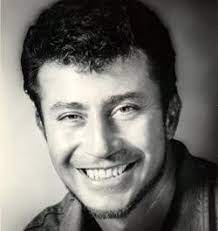 |
| John Rechy |
The narrator portrays himself as the macho street kid who’s only doing it for money but occasionally, with another hustler or one of the scores, he almost feels the tug of involvement. But that tug has to be resisted, because it would undermine his conviction that he isn’t really a fag. These are some of the book’s most revealing scenes. He never admits to love and only rarely to desire. Desperation is what drives the denizens of the Cities of Night onto “the lonely, crowded, electric streets.”
John Rechy creates a syntax of his own, routinely omitting the apostrophes in words like “isnt” and “dont”. Fragmented paragraphs bristle with dashes and ellipses (…). Past and present tenses are randomly mixed. He sandwiches words together to create a vivid new vocabulary: “nightworld”, “malehustler”, “sexhungry”. The hallucinatory writing recalls Jack Kerouac and William Burroughs, so much so that I wonder if either of them contributed to the edit. The fractured narrative becomes repetitive, but there’s no denying the powerful impact of this nightmarish journey through the Gay Underworld. “We’re trying to swim in a river made for drowning.”
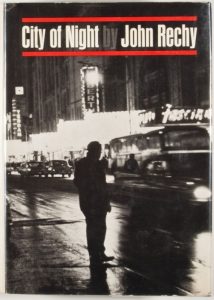 |
| the original 1960s cover |
This is not an erotic novel. The sex between hustler and score is rarely described and never detailed. Rechy’s second novel – Numbers – and its successors were a lot more explicit, and he abandoned the zonked-out Beat-poetry style for the pared-down prose of Harold Robbins or Mickey Spillane.
Reading City of Night in the 1960s, it seemed exotically different and daring. London’s gay scene was a pale echo of New York’s; Piccadilly and Leicester Square never quite had the lurid tawdriness of 42nd Street or Times Square. A few pages from the end Rechy seems to foresee the rich harvest the Grim Reaper will gather from this relentlessly promiscuous community two decades later: “death lurking prematurely in a threatening black-out”. In 1963 John Rechy was a kind of “Pied Piper” figure, and as we know, the Piper – one way or another – has to be paid.
What I’m reading: An ending that will stay with you forever

DELIA OWENS: Where the Crawdads Sing
I’m a couple of years late reading this novel, which is surely set to become a modern classic. Abandoned by her mother and her siblings, Kya Clark grows up in a shack in the North Carolina marshes with only her brutal alcoholic father for company until even he disappears. Scorned by almost all the townspeople, she gives up on school after just one day. A local boy teaches her to read; they both become experts on the flora and fauna of the swamp and the ocean. When the boy leaves to go to college, Kya replaces him in her affections with a rich-kid lothario who we know from the beginning is destined to die under mysterious circumstances.
Delia Owens brings the marshes and the creatures that live there vividly to life. She has a wonderful way with words: ‘Barkley Cove served its religion hard-boiled and deep fried.’ Inevitably, Where the Crawdads Sing brings echoes of other great writers from the Deep South, notably Harper Lee and Truman Capote. The rustic courtroom scenes have all the drama and tension of To Kill a Mockingbird.
More than once this heartbreaking story of love and loss brought tears to my eyes. The ending is one that will stay with you forever. This is without doubt one of the finest novels this century is likely to produce.
LILLIAN AND THE ITALIANS: Two more reviews on my Blog Tour

Two five-star reviews I garnered during my US Blog Tour with Gay Book Promotions this week:
What I’m reading: The very best of English writing

Kate Atkinson: TRANSCRIPTION
Eighteen-year-old Juliet Armstrong takes a job with MI5 in 1940, typing up tedious transcriptions of the monitored conversations of Nazi sympathizers. She also infiltrates their ranks as a ‘fifth columnist’. It takes her a while to realize that one of her team is a double agent and even longer to do something about it. The operation leads, more or less accidentally, to two murders.
A decade later, Juliet is a junior producer with children’s radio at the BBC. An anonymous letter threatens consequences from past events. As more of that past is revealed, Transcription acquires increasing hallmarks of a spy thriller, although the author’s sprightly prose means that comedy overtones accompany even death and burials. “They were at a loose end without a funeral tea to go to. Poor Joan didn’t seem entirely dead without a glass of sherry and a slice of Dundee cake to send her across the Styx.”
As in Atkinson’s previous novels, the writing is crisp and witty, often aphoristic, with pleasing echoes of the late great Muriel Spark and even Alan Bennett. The ending – and a fascinating Author’s Note – provides a splendid surprise and a resonance with one of history’s greatest spy scandals. Kate Atkinson is without doubt one of our finest current writers.
* * *


